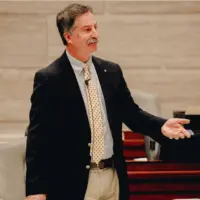
BY: RUDI KELLER
Missouri Independent
The bill authorizing state support for professional sports stadiums is unconstitutional because it grants public aid to private interests and combines widely different and unrelated subjects, according to a lawsuit filed Thursday by two state lawmakers.
State Sen. Mile Moon, a Republican from Ash Grove, and state Rep. Bryant Wolfin, a Republican from Ste. Genevieve, filed the case in Cole County Circuit Court. They were joined as plaintiffs by Ron Calzone, a long-time activist who has successfully challenged past legislation on constitutional grounds.
During a special session in June, lawmakers passed the bill to provide up to $1.5 billion in state tax funds to back bonds that would finance new construction or stadium improvements for the Kansas City Chiefs and Royals. Gov. Mike Kehoe pushed for the bill to counter moves from Kansas intended to lure one or both teams across the state line.
Moon objected to the bill as unconstitutional when it was passed and said in an interview Thursday that getting court guidance over what can and cannot be in a single bill is an important goal of the lawsuit.
The Constitution “kind of gives us our marching orders for legislators and how we pass bills and what they should look like,” Moon said. “Can you amend the bill beyond a certain point? I’ve come to realize it seems like we have veered way off the road.”
Kehoe let his ambition to retain the Chiefs and Royals cloud his constitutional judgment, Moon said.
“This was a pretty big deal for the governor,” Moon said. “I’m not knocking the governor, but yet he was a legislator at one time, and he should know the bounds that we are governed by.”
In the bill, stadium construction would be financed by diverting tax money from economic activity surrounding the teams — sales tax on tickets, merchandise and food, income tax from player and team staff salaries — to repay bonds.
The bill also included provisions to:
- Cap increases in property tax bills in most counties of the state. There are 75 counties where basic tax bills would not increase more than 5% per year or the rate of inflation, whichever is greater, and 22 where no increase would be allowed.
- Extend a tax credit for amateur sporting events.
- Provide a tax credit for damage from natural disasters this year to help property owners recover losses not met by insurance or other payments.
- Require the courts to preserve any portions of the bill found constitutional by severing them from unconstitutional portions.
The lawsuit seeks to toss the bill in its entirety, alleging that it violates requirements that bills be limited to a single subject with a title that “clearly” states its purpose. The petition also alleges the bill was amended to go beyond its original purpose and that the property tax provisions are “special laws” forbidden by the constitution.
“The stadium provisions subsidize business enterprises; the tax credits for disaster relief and for property tax relief subsidize homeowners,” attorneys W. Bevis Schock and Erich Vieth wrote in the lawsuit for Moon and Wolfin. “The former showers beneficence on billionaires; the latter showers the beneficence on all homeowners. The former will likely produce political contributions in vast sums from those able to make such contributions; the latter will likely produce political benefit but likely no political contributions.”
The title of the bill, relating to taxation, is so vague as to be meaningless, the attorneys wrote.
“The bill’s procedural infirmities,” they wrote, “mean it is not severable and fails in its entirety.”



